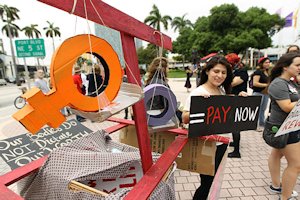A Nation of Minorities
 | | Here we see President Obama asking George Clooney for campaign funds so that he can make sure Clooney's tax rate goes up |
For the last few weeks, Democratic leaders--from the president on down--have called on presumptive Republican nominee Mitt Romney to release more than two years of his tax returns. This is important, they argue, because one of the central issues of this year's election is the tax code. President Obama has been calling for everyone to pay their "fair share," which requires the top income brackets to give more money to the government, while Republicans have been fighting tooth and nail to extend the Bush-era tax cuts to everyone, including the ridiculously high earners. Since taxation has become such a contentious matter in this cycle, they say, it is absolutely imperative we understand how Romney, the man who seeks to replace Obama, approaches his own taxes.
This raises several questions, including what "fair" actually means. The relevant definition on Miriam-Webster online is "marked by impartiality and honesty: free from self-interest, prejudice, or favoritism." The thing is, this definition means very different things depending on your political perspective. For many conservatives, a "fair" tax would be one that applies to everyone equally, irrespective of circumstance. A good example would be sales tax, as a sales tax doesn't care if you are rich or poor, black or white, Republican or Democrat. However, for self-ascribed "progressives," a sales tax is inherently unfair for precisely the same reason. It's "regressive," they argue, because it burdens poor people more than it burdens the rich by treating them as equals. A "fair" tax, according to progressives, is one that asks the wealthy to pay more than the disadvantaged. By these standards, the two ends of our political spectrum have conflicting interpretations of fairness, and the partisans tend to stare slack-jawed in disbelief that the other side defines "fair" in exactly the opposite way that they do.
This is why the president can argue with a straight face that Mitt Romney's 15% tax rate is too low, even though 47% of Americans pay 15% less than that. You see, as the president himself has correctly--if somewhat condescendingly--pointed out, there is a certain amount of luck involved in success. Drive and hard work are essential ingredients, but they are not the only ingredients as hardcore conservatives might assert. If you look at the world through the lens of liberal progressivism, however, the luck factor renders every poor person "disadvantaged" and "less fortunate" by no fault of their own. They argue that this is why so many people shouldn't have to pay any taxes at all while Mitt Romney should pay well over 15% of his income.
 | | It couldn't be simpler |
The unstated major premise here is that paying taxes is equivalent to giving to the needy, that if rich people pay more in taxes, then poor people will reap the benefits. Call me cynical, but I highly doubt that every penny I've given to the government over the years has been spent on feeding the poor, clothing the homeless, and building American infrastructure. The reason I disagree with the progressive worldview espoused by the president and the modern Democratic Party is that I don't believe the government can compensate for the vagaries of luck in life, and that any attempts to do so will cause a flurry of unintended consequences that will only serve to make things worse. I don't think it's "fair" that a writer born with a big-name publisher for an uncle can get published with a single phonecall--while I have to work and work and work just to get my big toe in the door--but I don't want the government to regulate nepotism or legislate publishing quotas that give me a leg up while punishing the well-born.
The problem is that it's easy to think of "fairness" as relative, and it doesn't only extend to taxes. Take the voter ID laws that are all over the news. Many argue that requiring a state-issued photo ID to vote is inherently unfair, since some people would have a hard time getting a state-issued photo ID and would therefore be denied an inalienable right. Forget that nobody seems to have a problem with requiring the same photo ID to buy a gun (which is also an inalienable right under our Constitution, whether you like it or not), and consider the extreme hypothetical of a $10,000 voting tax. This tax would apply to everyone equally and would not discriminate, but few would argue that it would be "fair." So if you're willing to make the concession that treating everybody equally can, under certain situations, be unfair, is there a slippery slope you can find yourself falling down? I think there is.
The modern Democratic Party divides the populace into competing groups of various inherent needs. Whether the dividing lines are along racial, ethnic, socio-economic, or gender boundaries, the United States is, in the Democratic view, a nation of minorities. Even the rich white man finds himself in a minority now, constantly reminded that he resides among a one percent that is hated and vilified by another ninety-nine percent that he is somehow responsible for. Women, too, despite making up roughly fifty percent of the citizenry, are to be considered a disadvantaged group in need of government protection. The way progressives defend government funding for Planned Parenthood and the necessity of free contraceptives, you can be forgiven for thinking that women would be left to fend for themselves in a cold, brutal world if it weren't for government intervention, that modern physicians in our phallo-centric, male-dominated culture would be totally flummoxed by the mysteries of the uterus if it weren't for Planned Parenthood paving the way for equality in medical care.
 | | Apparently, you can't fight breast cancer without funding Planned Parenthood either |
Of course, historically, this country does not have a sterling record of humanitarianism when it comes to women and minorities. It is all too easy for us to look back at our past and see shameful examples of slavery, racism, sexism, bigotry, and ignorance. Indeed, we don't even have to be very far-sighted to see it. We used to put children in factories, homosexuals in asylums, Japanese-Americans in internment camps, political dissenters on black lists, black people on plantations, and unmarried mothers in convents. For well over two centuries, Americans have fought--battered, insulted, and bloodied--for their rights to think for themselves, to speak up, to vote, and to be treated with equality, and the long struggle for that ideal is far from over.
However, it is easy to let this quest for true equality--dare I call it fairness--force us into an ever-increasing factionalization, where we must identify each other by a list of qualifiers in order to know how we can treat people. In this discordance, we would need an all-knowing bureaucracy of central planners to sort out the requirements of each special interest group, to allocate resources from those who are deemed the least worthy to those who are deemed the most needy. This, as many a fallen economy can tell you, is no way to run a country. Perhaps this explains why I find the casualness with which the president throws around "fair share" so distressing.
Certainly we have a civic responsibility to be kind to our fellow man, to help out those in need and to treat each other with dignity. Certainly we should not be allowed to let prejudice win out over civil discourse and respect. Certainly those who have been blessed should lend a helping hand to those who have not. But does that give our leaders--local, state, or federal--the power to enforce what they consider right and true? Where is the line between individual responsibility and enforced morality, and more importantly, who should draw it? These are questions at the very heart of the American experiment, and they define the political discussion between right and left in this country.
 | | Pinheads and Patriots, a.k.a. Divisiveness for Dummies |
This is not to say that the right is a champion of individual responsibility in all matters whereas the left is a devout believer in government coercion, because that would be far too simplistic a view. The Republican Party, in its own way, has just as much investment in forcing its skewed perspective on the people of the United States as the Democratic Party does, is just as guilty of carving up the nation into us and them. Where the Democratic Party generally defines people on social terms, the Republican Party tends to classify people on ideological grounds. While a liberal might prejudge you by the percentages on your tax returns or the color of your skin, a conservative will judge you on the basis of your religious values or the traditionalism of your family.
To the Republican Party, you are either pro-choice or pro-life. You either fight for state's rights or you are an accomplice to big government. You either believe in free market economics or you're a goddamn socialist. You either support the military or you should just get the hell out. You're either with us or you're against us, a patriot or a pinhead. This is how the Republican Party views the nation, and it's just as dangerously cacophonous. Is it any wonder, then, that the one thing both sides seem to agree on these days is that we've become too polarized?
The ideal is a melting pot, a country where diversity and equality are the same thing, where everybody is treated fairly by justice that is blind. It was because of this ideal that I used to quote Washington's farewell address, in which our first president warned against political factions and the emergence of party politics. However, as I've grown older and I've come to realize that disagreement and factionalization is inevitable, I've turned into a follower of Madison, possibly the most misunderstood of the early presidents. The genius of Madison's vision of the United States is that he ensured the argument would never be settled, that no one side of the political debate would ever actually win. As long as we are bickering over the meaning of America, America still exists. It's a paradox, to be sure, crafted by a true partisan politician, but despite a civil war that almost destroyed it, the paradox persists to this day, in defiance of all logical expectation. Still, I don't think we should encourage it, because we might just be pressing our luck.
-e. magill 8/21/2012
|
|